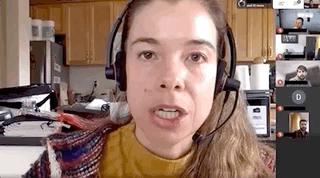Exercise causes aging molecules to shift | Dr. Michael Snyder
Get the full length version of this episode as a podcast.
This episode will make a great companion for a long drive.
The BDNF Protocol Guide
An essential checklist for cognitive longevity — filled with specific exercise, heat stress, and omega-3 protocols for boosting BDNF. Enter your email, and we'll deliver it straight to your inbox.
Genetics plays an important role in longevity, but there is also a strong lifestyle component. Dr. Snyder's research, using deep molecular measurements, indicates that when you exercise, a profound molecular change occurs — particularly when it comes to immune molecules. Exercise induces a variety of beneficial cytokines and other factors that support immune health. In this clip, Dr. Michael Snyder describes how a robust immune system is critical to healthy aging and can be boosted by exercise.
Dr. Snyder: Exercise induces a lot of stuff that's beneficial, myostatins, all kinds of useful things, endorphins. And the other thing, especially for aging, in fact, if you talk to anyone in the aging field, almost all of them will say exercise is number one for longevity, food, number two. And you know, I can see why they would say that. When people get older, you know, one of the number one problems they have is sarcopenia. So you know, loss of muscle mass and exercise certainly keeps that up. And now there are studies...they used to tell people who are 80, you know, old take it easy, relax so you don't hurt yourself. But actually what you really want them to do is just the opposite. You want them to get up out of the chair and move around because they'll actually live longer and be healthier than if they just sit around in their chair. And now there's studies out there like that.
So, exercise, there's no question it's very beneficial. We don't even understand how it works. It's pretty cool, there's a study ran by NIH that's launching now, or launched a few years ago but we're in the middle of it. It's a $170 million study to try and understand the benefits of exercise both aerobic training, so running, biking versus resistance training, and see what promotes, what benefits, and how does it work. It'll be very fun to see what comes out of that study.
Dr. Patrick: Totally. And you had a study that was published not long ago on some of the metabolic changes of exercise.
Dr. Snyder: We did, yeah. So we did the same deep molecular measurements on people who did exercise. We discovered half your molecules change when you run to what's called your VO₂ max. Your VO₂ max is also an indicator of longevity, it's actually one of the best indicators of longevity. So we did, we saw changes we could see that, you know, a lot of immune molecules shifted. And that makes sense, you boost your...you know, you remodel your muscle mass, to be honest, when you exercise, especially with resistance training. And then all kinds of metabolic control markers changed too.
And I'm sure all that stuff's very, very powerful in the context of the current pandemic, the COVID-19. Being able to have, you know, a strong immune system is really key, I think, to longevity. You may not know but you're getting cancer your entire life, and you're clearing it your entire life. Why is it that old people get cancer? Well, what happens is your immune system declines, especially in people in their 60s. And so suddenly, these cancer cells that you've been clearing are getting old, and then they can actually burst out and you get cancer. So I think keeping immune health is, in my mind, probably the number one thing and exercise definitely promotes immune health. All kinds of beneficial cytokines and other factors are induced by exercise. So yeah, I think it's...
Dr. Patrick: Do you think that there's a bigger component for genetics or lifestyle in some of that, like, how your immune system is aging versus your heart or your liver? Is it a combination of them or is it one or the other?
Dr. Snyder: For sure, it's a combination, yeah. How much of aging is due to genetics, there's no question there's a strong genetic component. You look at centenarians, they run in families. But there's also a strong environmental component, you don't have to look past smoking, or some of the things you described earlier, living near highways, to see how to, you know, decrease people's lifespans. And so a lot of risk factors of all sorts have been associated with lifespan. So the one thing about the environmental factors, the hope is that we can control that, and lifestyle factors. Those are things we do have control over, genetics is a lot tougher.
Member only extras:
Learn more about the advantages of a premium membership by clicking below.
Attend Monthly Q&As with Rhonda
Support our work

The FoundMyFitness Q&A happens monthly for premium members. Attend live or listen in our exclusive member-only podcast The Aliquot.
Exercise News
- A simple strength-to-weight measure flags cardiovascular disease and mortality risk in middle-aged and older adults.
- Brief movement breaks during sitting improve blood sugar control after a meal in adults with obesity.
- Antioxidant vitamins strengthened training gains in older women with sarcopenia.
- Hot baths improved cardiorespiratory fitness in endurance runners by boosting red blood cell mass and heart function.
- Late-life exercise may partly reset epigenetic aging in skeletal muscle.






